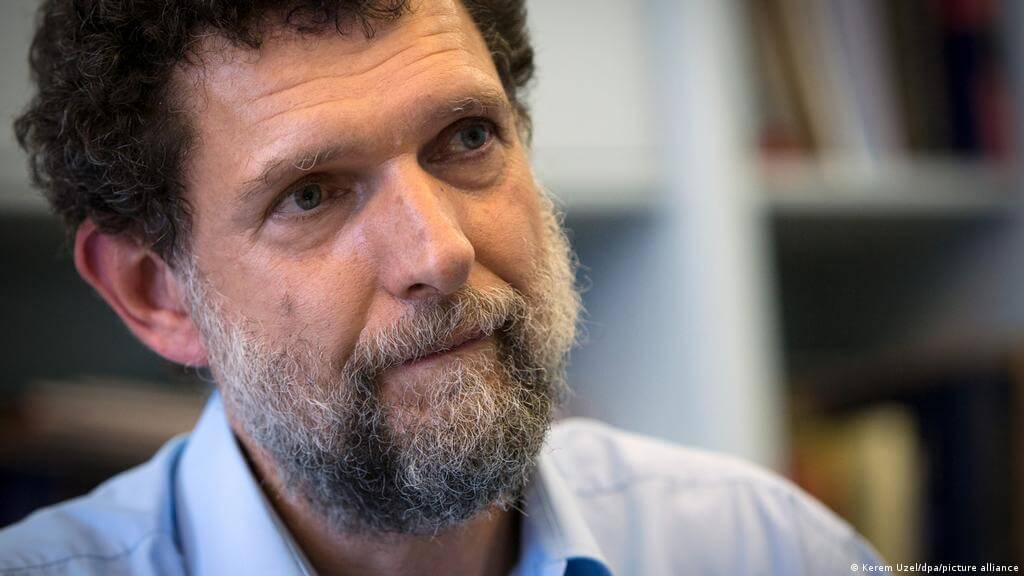The United States (US) on Monday condemned a Turkish court’s decision to convict human rights activist and philanthropist Osman Kavala to life in prison for allegedly attempting to overthrow the government by financing the 2013 Gezi Park protests.
State Department spokesperson Ned Price said that Washington “is deeply troubled and disappointed by the court’s decision” to convict Kavala. “His unjust conviction is inconsistent with respect for human rights, fundamental freedoms, and the rule of law,” Price asserted.
This marks another dark day for the rule of law and fundamental freedoms in Turkey. Osman Kavala now faces life in prison for bogus charges after already being detained for four and a half years without being convicted.
— Senate Foreign Relations Committee (@SFRCdems) April 26, 2022
This is not justice. https://t.co/bBcDjzgsaS
He added the US is “gravely concerned by the continued judicial harassment of civil society, media, political and business leaders in Turkey, including through prolonged pretrial detention, overly broad claims of support for terrorism, and criminal insult cases.”
In this regard, Price urged Ankara to release Kavala and allow Turkish citizens to “exercise their human rights and fundamental freedoms without fear of retribution.” “We urge the government to cease politically motivated prosecutions and to respect the rights and freedoms of all Turkish citizens,” he added.
It is an abomination that Turkey sentenced civic activist Osman Kavala to life imprison. He did nothing other than have an independent voice, but President Erdogan seems to need to blame someone for the widespread opposition to his autocratic rule. https://t.co/kx02sfcWkG
— Kenneth Roth (@KenRoth) April 26, 2022
On Monday, a Turkish court ordered that Kavala be jailed for life without parole after finding him guilty of financing the 2013 Gezi Park protests that eventually led to nationwide protests against then Prime Minister Recep Tayyip Erdoğan. The Gezi Park protests erupted after the government decided to remove the park, one of the few green spaces in Istanbul, for an urban development project.
The court also sentenced seven others involved in the protests to 18 years in prison.
Kavala was arrested in 2017 over his alleged involvement in the protests against Erdoğan’s government and has been in jail since. Erdoğan has also accused Kavala of financing the 2016 military coup attempt and of funding anti-government organisations. Although he was acquitted of all charges in February 2020, an appeals court overturned the verdict the following month.
Turkey just plunged into further darkness. Businessman, peace maker, philanthropist all round good human being Osman Kavala is convicted on bogus terrorism charges and sentenced to life in jail.
— Amberin Zaman (@amberinzaman) April 25, 2022
A supporter of political freedom and the role of civil society organisations, Kavala has made significant contributions to the establishment of several political, social, environmental, and cultural NGOs since the 1990s. He is also known for his strong support for Turkey’s brand of secularism and his efforts to harmonise relations between the Turkish Muslim majority and non-Muslim minorities like the Armenians and Kurds, something which landed him in trouble with Erdoğan’s government.
Human rights organisations have repeatedly called for the release of Kavala. In 2019, the European Court of Human Rights (ECHR) urged Turkey to release him, saying that the arrest was meant to silence Kavala and that his arrest was not supported by any evidence of offence. In September, the Council of Europe (CoE) said it would start infringement proceedings against member-state Turkey in November if Kavala was not released.
The Turkish Court's life sentence for Osman Kavala together with heavy prison sentences for other defendants show maximum harshness.
— Josep Borrell Fontelles (@JosepBorrellF) April 25, 2022
They ignore the decision of the European Court for Human Rights.
Respecting fundamental rights and freedoms is today more important than ever.
The CoE said on Tuesday that it was “very disappointed” with the verdict, which it said was “yet another missed opportunity for courts in Turkey to comply with the judgment” of the ECHR. Kavala’s sentencing was also condemned by Germany. “This sentence stands in stark contrast to the rule-of-law standards and international obligations to which Turkey is committed as a member of the Council of Europe and an EU accession candidate,” German Foreign Minister Annalena Baerbock said on Monday.
However, Turkey has rejected calls to release Kavala. Turkish Justice Minister Bekir Bozdağ demanded that foreign countries stop interfering in Turkey’s domestic affairs. “Neither the United States nor any other country has the right to have a say in Turkey’s trial. Let them mind their own business,” he said.
The case of Kavala has been a constant source of friction between Turkey and the West. In October last year, Turkey expelled the ambassadors of ten western countries, including the US, France, Canada, and Germany, after the embassies of the ten countries issued a joint statement condemning Turkey’s detention of Kavala.

